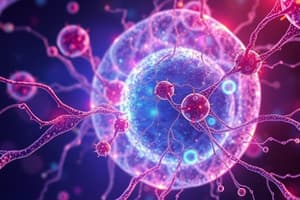Podcast
Questions and Answers
What defines the structure of cells at an atomic level?
What defines the structure of cells at an atomic level?
- Specialized components
- Membrane proteins
- Atomic precision (correct)
- Organelles
Which cellular component manages the passage of nutrients and waste while regulating the entry of molecules?
Which cellular component manages the passage of nutrients and waste while regulating the entry of molecules?
- Mitochondria
- Organelles
- Membrane proteins (correct)
- Ribosomes
How do cells maintain stability and regulate factors like pH and temperature?
How do cells maintain stability and regulate factors like pH and temperature?
- Through cell division
- By DNA replication
- Via feedback loops (correct)
- Using cell signaling pathways
What type of pathways enable cells to respond to changing conditions by initiating actions like gene transcription?
What type of pathways enable cells to respond to changing conditions by initiating actions like gene transcription?
Which type of cell division results in the formation of new cells in both single-celled and multicellular organisms?
Which type of cell division results in the formation of new cells in both single-celled and multicellular organisms?
What elaborate process involves the creation of new proteins within a cell?
What elaborate process involves the creation of new proteins within a cell?
What is the main difference between mitosis and meiosis?
What is the main difference between mitosis and meiosis?
How do hormones and neurotransmitters facilitate intercellular communication?
How do hormones and neurotransmitters facilitate intercellular communication?
What are some examples of careers in cell biology?
What are some examples of careers in cell biology?
How does understanding cellular mechanisms impact healthcare?
How does understanding cellular mechanisms impact healthcare?
Why do researchers often collaborate with experts from other areas of biology?
Why do researchers often collaborate with experts from other areas of biology?
What is the significance of cell biology in synthetic biology?
What is the significance of cell biology in synthetic biology?
Flashcards are hidden until you start studying
Study Notes
Exploring Cellular Life: An Overview of Cell Biology
Cell biology lies at the heart of modern biology, revealing the intricate dance of life occurring within each individual cell. These microscopic units serve as the building blocks for living beings, constantly engaging in complex interactions to maintain, grow, and reproduce.
As a fundamental aspect of biology, cell biology encompasses a wide variety of disciplines spanning molecular, structural, and physiological dimensions. Cellular functions range from simple diffusion across membranes to elaborate processes like DNA replication and protein synthesis.
Key Components of Cell Biology
Structure and Organization
Atomic precision defines cells' structure. Organelles—specialized components such as mitochondria and ribosomes—carry out essential functions, often separated from one another to increase efficiency and minimize interference. Membrane proteins manage the passage of nutrients and waste while preventing unwanted molecules from entering.
Homeostasis and Regulation
Cells maintain stability through precise regulation. Feedback loops control vital factors like pH, temperature, and nutrient availability. Cell signaling pathways enable cells to respond to changing conditions, initiating actions ranging from gene transcription to apoptosis (programmed cell death).
Growth and Division
From single-celled organisms to multicellular ones, cells divide to make new cells. Each division increases the population's size and ensures continuance across generations. Mitosis generates genetically identical daughter cells capable of surviving independently, whereas meiosis produces gametes with unique genetic combinations suitable for producing offspring.
Communication and Coordination
Intercellular communication occurs via signaling molecules called hormones and neurotransmitters. Both chemical and electrical signals propagate information among cells, enabling organizations to coordinate and adapt to environmental challenges.
Cell biology underpins more advanced fields like human disease, developmental biology, and synthetic biology. Researchers frequently collaborate with experts from other areas of biology to address pressing issues and promote discovery.
Real-World Applications and Careers in Cell Biology
Understanding cellular mechanisms enables advances in healthcare, agriculture, and energy production. By deciphering cellular processes, we gain insights into diseases, evolve agricultural practices, and develop clean energy technologies.
Examples of careers in cell biology include:
- Laboratory technician (processing samples, maintaining equipment)
- Research assistant (conducting experiments, managing data)
- Clinical research associate (overseeing clinical trials)
- Genetic counselors (helping individuals understand and cope with inherited disorders)
- Science communicator (sharing research findings with broad audiences)
Involving yourself in the exciting realm of cellular biology opens doors to cutting-edge research, transformative discoveries, and rewarding careers.
Studying That Suits You
Use AI to generate personalized quizzes and flashcards to suit your learning preferences.




